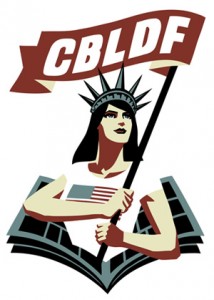 This week, CBLDF advocated for the First Amendment right to offensive speech by joining an amicus brief filed in the United States Supreme Court by the Cato Institute and that includes amici P.J. O’Rourke, Nat Hentoff, and Nadine Strossen. The brief filed in Walker v. Texas Division, Sons of Confederate Veterans addresses whether Texas can deny the organization a spot on their “specialty license plate” program because their logo includes the Confederate flag, which could set a harmful precedent for the First Amendment if such potentially offensive speech is suppressed.
This week, CBLDF advocated for the First Amendment right to offensive speech by joining an amicus brief filed in the United States Supreme Court by the Cato Institute and that includes amici P.J. O’Rourke, Nat Hentoff, and Nadine Strossen. The brief filed in Walker v. Texas Division, Sons of Confederate Veterans addresses whether Texas can deny the organization a spot on their “specialty license plate” program because their logo includes the Confederate flag, which could set a harmful precedent for the First Amendment if such potentially offensive speech is suppressed.
CBLDF joins coalition efforts like these to protect the freedom to read comics. Censorship manifests in many ways, and the unique visual nature of comics makes them more prone to censorship than other types of books. Taking an active stand against all instances of censorship curbs precedent that could adversely affect the rights upon which comics readers depend.
In response to a decision by the Texas Department of Motor Vehicles, which rejected the license plate design submitted by the Sons of Confederate Veterans on the grounds that it was potentially “offensive” to other community members, the Cato Institute submitted the brief of amici curiae to the United States Supreme Court, pointing out the gross implications of the agency’s decision for freedom of speech and ultimately urging the Supreme Court to overturn the clear violation of the group’s First Amendment rights.
Although the core of their argument stems from the DMV’s rejection of the plate, citing the statute that the agency is authorized to turn down any design that “might be offensive to any member of the public,” the Cato Institute’s call for action goes beyond a simple specialty license plate. If a governmental agency has the right to determine what is too offensive for the public in this instance, where does it stop? And at what point does the government have the ability to not only regulate and take action against speech, but also citizens’ ideas and beliefs?
In a time during which we are seeing free speech threatened and violently acted upon around the world, it becomes quickly apparent that these types of domestic issues are another symptom of an increasing epidemic, as Ilya Shapiro, Trevor Burrus, Robert Corn-Revere, and P.J. O’Rourke explain in an article for the Cato Institute:
Texas’s stance is particularly worrying given that it comes at a time when free speech is being threatened to an extent not seen in some time. Throughout Europe and the Anglosphere, liberal democracies are increasingly intolerant of offensive speech, enacting open-ended hate-speech laws, prohibitions on blasphemy, and “human rights” protections against insulting not just individuals but communities and abstract concepts.
The Cato Institute and CBLDF urge the Supreme Court to not only understand the full implications of the DMV’s decision, but to also understand that a major part of granting U.S. citizens the right to free speech is that they have the ability to talk about and support a range of ideas and beliefs, including those which might be offensive to other people:
Together with a team of expert offenders of good taste — and equally expert defenders of free speech — we have filed an amicus brief urging the Supreme Court to reaffirm that the First Amendment protects the speech of unpopular minorities, even when the proffered justification for censorship is its putative “offensiveness.”… There’s no “offensiveness” exception to the First Amendment and it would be insulting for the Supreme Court to allow Texas to tell us what’s offensive. Those who are offended shouldn’t have a veto over free expression and putative offenders should be judged in the court of public opinion.
You can read the legal brief in its entirety here.
Help support CBLDF’s important First Amendment work in 2015 by visiting the Rewards Zone, making a donation, or becoming a member of CBLDF!